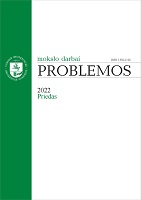G. Agamben and the Biopolitical Understanding of the Shoah
G. Agamben and the Biopolitical Understanding of the Shoah
Author(s): Luc AnckaertSubject(s): Ethics / Practical Philosophy, Political Philosophy, Social Philosophy, Contemporary Philosophy
Published by: Vilniaus Universiteto Leidykla
Keywords: Agamben; Shoah; sovereign power; biopolitics; homo sacer;
Summary/Abstract: The Italian philosopher Giorgio Agamben, in his Homo Sacer-cycle, has developed a new paradigm for thinking the Shoah. Departing from Michel Foucault’s biopolitical thought, he argues that modern political power is made possible by the helix-structure of sovereign power and homo sacer. Sovereign power is situated at the threshold of the prevailing juridico-political order and can, in a state of exception, violently suspend or establish the law. In this decision, homo sacer is legally excluded from the law. When the state of exception is made general, the law of sovereignty governs all life and everyone becomes homo sacer. This happened concretely in the Shoah. In the concentration camps, the Muselmann is produced. During the Shoah by Bullet, as happened in Lithuania, the generalised sovereign biopolitics turns into radical thanatopolitics.
Journal: Problemos
- Issue Year: 2022
- Issue No: Suppl.
- Page Range: 56-68
- Page Count: 13
- Language: English

